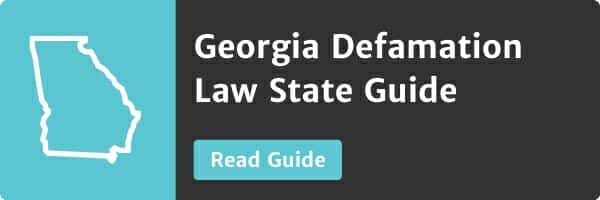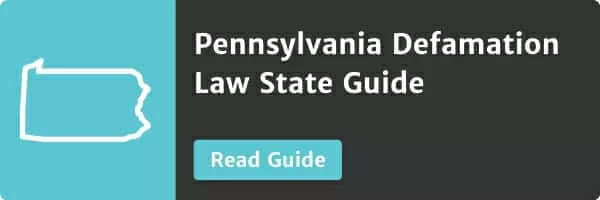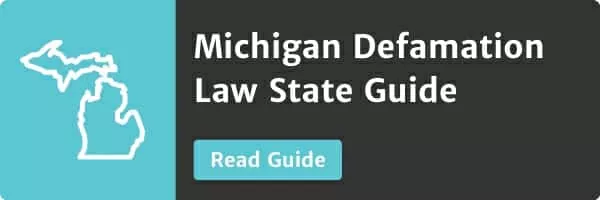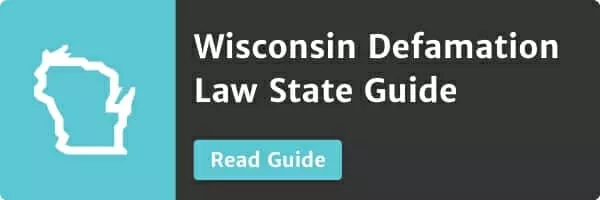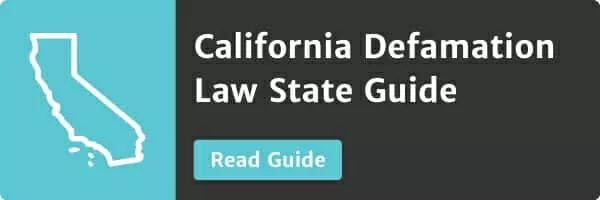
- Originally Published on November 9, 2018
The Minc Law Guide to North Carolina Defamation Law
What is Defamation? North Carolina’s Definition of Defamation
“Defamation,” also known as “defamation of character,” is an overarching and all-encompassing legal term for the written or spoken publication of a false assertion of fact to a third-party, which ultimately causes harm or injury to the reputation of another party. Defamation is recognized as a civil wrong in Common Law Jurisdictions (think Australia, Canada, United Kingdom), aka a tort, and is thus, accompanied with a plea and request for damages. Defamation may also be commonly referred to as the “tort of defamation.”
Specifically, defamation can be broken down into two core types: libel and slander. Note that it is extremely important to familiarize yourself with both definitions, as their legal requirements and formalities may substantially differ depending on the state – meaning, you could possibly have your claim denied or dismissed should you fail to follow the requisite formalities.
Let’s take a look at the differences between libel and slander:
- Libel: the written or published (videos, text, photographs, or other media) false assertion of fact to a 3rd-party or entity, which ultimately causes harm or injury to another person’s reputation.
- Slander: the spoken communication of a false assertion of fact to a third-party or entity, which ultimately causes harm or injury to another person’s reputation.
In today’s technological age, one where persons are on the Internet more than they are actually outside, defamation most commonly manifests itself in one form – libel. Unfortunately, the general public often confuses both libel and slander, and often opts for using “slander” as an all-encompassing term for defamation. This is incorrect, and stands to carry serious consequences, as it may impact a defamation plaintiff’s legal rights in significant ways.
For example, some states will have varying legal formalities and requirements for libel and slander lawsuits, meaning a plaintiff must proceed in a specific way or certain time period for their claim to be accepted or valid. Slander and libel generally differ in respect to their formalities and requirements due to the fleeting nature of slanderous statements, after all, they aren’t inscribed in a tangible medium and evidence may quickly dissipate.
Due to this, slander actions are generally required to be brought before libel actions (statute of limitations). So, make sure you pay close attention to both definitions and remember to acquaint yourself with your state’s respective libel and slander formalities and requirements!
So, what are some other common names for the tort of defamation?
Defamation of character may also commonly be referred to as:
- Traducement,
- Vilification,
- Character assassination,
- Calumny, and
- Disparagement.
While ‘disparagement’ is sometimes used to describe defamation, this is actually a misnomer, as disparagement refers to the damage to a business or person’s financial and proprietary rights, rather than damage to their reputation. Furthermore, disparagement is actually a separate tort, and may be referred to as “the tort of business/commercial disparagement.” If you’d like to read up further about disparagement and how it differs from defamation (along with the requisite elements for a successful claim), head on over to our comprehensive blog post here.
What are some popular names for persons who publish and communicate defamatory statements to third-parties?
- Defamers: a popular and overarching term used to describe persons who publish and communicate defamatory statements to a third-party.
- Slanderers: a term used to describe persons who orally communicate defamatory statements to a third-party.
- Libelers: a term used to describe persons who publish defamatory statements to a third-party.
- Famacide: a rarely used and somewhat archaic term for persons who communicate or publish defamatory statements, as it literally means “to destroy another’s reputation.”
Now that we’ve tackled the general definition of defamation in the United States, let’s turn to how North Carolina defines defamation, along with the necessary elements a North Carolina plaintiff must prove in order to succeed in their defamation action.
Contact us for personalized, effective representation. Let us help you protect your image and preserve your good name.Don't let defamation control your image.
North Carolina’s Definition of Defamation
Under North Carolina defamation law, libel is the publication of false statements about another in written or broadcast form, while slander consists of spoken false statements about another.
For North Carolina defamation plaintiffs to succeed in their libel or slander lawsuit, they must prove the following four (4) elements:
- False statement of fact;
- Cause of injury to the plaintiff’s reputation;
- Of and concerning the plaintiff;
- Published to a third person.
Note that for the third element of a North Carolina defamation claim, the statement or publication must me “of and concerning the plaintiff,” which simply means it must be about and identifiable as the plaintiff. Under North Carolina defamation law, for a defamatory statement to be actionable, “they must refer to some ascertained or ascertainable person and that person must be the plaintiff.”
To help better our understanding of defamation law in North Carolina, let’s turn to four notable defamation cases.
Four North Carolina Defamation Cases
As of date of publish, no meaningful Internet defamation cases have made it to the appeals process in North Carolina.
Below are four notable defamation cases in North Carolina:
- Affirmative action policy: The court held that a newspaper report about a dean’s handling of an affirmative action policy had a defamatory and non-defamatory interpretation, so it could not be considered libel per se. Curious about what ‘per se’ statements are? Keep reading, we tackle libel and slander per se in the latter half of this section.
- Exorbitant legal services: The plaintiff, a member of a law firm, was running for office, and an opponent ran ads against the plaintiff. In the ads, the defendant claimed that the plaintiff had charged the taxpayers $28,000 per hour for legal services. The court held that this claim was false and defamatory. The plaintiff had sued the city on a contingency fee basis and won a large reward. Although the ad was true in some respects, the average person would not have understood what the ad meant, as it was intentionally misleading and therefore defamatory.
- Professional fraud: Statements to colleagues that a research was a “fraud” was considered to be slander per se in North Carolina. Once again, we’ll address the concept of slander and libel per se below.
- Bestiality: The court found that alleging that someone was engaging in bestiality and molesting children was slander per se.
In this comprehensive blog post, we’re going to take you through all four (4) elements required to be proved by a North Carolina defamation plaintiff in order to succeed in their claim, and much, much more.
If you’re wondering how North Carolina’s defamation laws compare to other U.S. states’? Check out our “Complete Guide to U.S. Online Defamation Law“.
U.S. Defamation Law Fact: As the United States has a longstanding history of enforcement of the U.S. Constitution and First Amendment (free speech), it’s generally considered a pro-defendant defamation jurisdiction, while European countries and other Common Law legal jurisdictions (Canada, United Kingdom, Australia) are typically considered pro-plaintiff jurisdictions.
Are you a resident of North Carolina or another U.S. state and have been the victim of online defamation or other slanderous attacks? Contact the nationally recognized internet defamation lawyers of Minc Law today! At Minc Law, we’re here to fight for your reputation and take back your online presence.
In our tenure as experienced defamation lawyers, we’ve litigated in over 19 states and 3 countries, removed over 25,000 pieces of defamatory online content, and support a nearly 100% online defamation removal rate. And, we do it all for a flat, reasonable fee. Rest assured when working with the defamation attorneys of Minc Law that you’re in good hands.
United States defamation law (and all state defamation law) can be highly complicated and nuanced, so we strongly recommend you consult an experienced professional before proceeding to remove defamatory and libelous online content.
Reach out today to schedule your free, initial no-obligation consultation with an intake specialist by calling us at (216) 373-7706 or by scheduling a meeting online.
Let’s put an end to the online defamation and abusive attacks today!
Now that you’ve acquainted yourself with North Carolina’s defamation definition and the requisite four (4) elements for a successful defamation claim, let’s turn to what libel and slander plaintiffs must plead and prove when bringing a defamation claim.
North Carolina’s Defamation Pleading Standard
Before we address the requisite pleading standard for libel and slander claims in North Carolina, let’s first try and grasp the purpose behind pleadings and why our legal system needs them. We just bet you’ve probably heard some of the following terms before – likely when watching one of your favorite legal television dramas.
For starts, what are pleadings and what do they cover?
At the very core of all lawsuits and claims, pleadings are specific formal, written documents and statements which are filed with a court. At their most basic, pleadings state:
- A plaintiff’s claims and arguments,
- The pertinent issues and facts of the case, and
- Any relevant defenses or other arguments by the defendant.
As defendants aren’t generally in the business of bringing lawsuits against themselves, pleadings are first proffered and filed by the plaintiff, or party who was injured. After all, what reason would a person have to implicate themselves and open themselves up to liability? After a plaintiff files the initial document (the complaint), the defendant will then have the chance to counter and respond to the asserted claims and issues.
Below are some of the most commonly used pleadings in the U.S. legal system:
- Complaint: the first pleading initiated and filed by the plaintiff, outlining their claims, issues, arguments, and allegations. A complaint will also contain what is called a “prayer for relief,” which is a request for damages suffered.
- Answer: a defendant’s answer to the plaintiff’s complaint, which responds to the claims, issues, arguments, and allegations set forth by the plaintiff, while including relevant defenses which may refute liability.
- Reply: oftentimes, a defendant’s answer will raise new claims, issues, arguments, or allegations, so that plaintiff will need an opportunity to respond to those. Cue the reply.
- Counterclaim: in some instances, a defendant may have their own separate claims against a plaintiff, which they may then file in a counterclaim – used to offset any initial accusations or arguments first proffered by the plaintiff.
Note that all states will have their own differing pleading requirements and formalities, so we strongly recommend you reach out to an experienced defamation attorney before initiating a defamation lawsuit. Consulting an experienced United States defamation attorney is integral for understanding all relevant legal claims and defenses surrounding your case, and identifying any important defamation deadlines, formalities, and requirements.
As we boast one of the most storied, litigated, and complex legal systems in the world, just remember that most states have developed their own bodies of case law governing the filing and procedural process for defamation claims.
For example, one state may require defamation plaintiffs to initiate their actions within a specific and shortened time frame, while another might be more relaxed, allowing for a plaintiff to file their action many years later. Furthermore, some states might require a defamation plaintiff to plead their action with particular language or in a specific way, while another may only require a plaintiff to plead the general statement and language in question.
So, what’s North Carolina’s defamation pleading standard?
Let’s take a look.
“We read these cases to require that the words attributed to defendant be alleged “substantially” in haec verba, or with sufficient particularity to enable the court to determine whether the statement was defamatory.”
The North Carolina Business Court held that North Carolina’s defamation claims must be pleaded with “particularity,” when read with N.C.R. Civ. P. 9(f), which requires the plaintiff to plead the:
- Time
- Place of any alleged defamatory statement.
However, recent decisions have held that this heightened pleading standard does not apply in federal court, where defamation cases fall under the liberal pleading requirement of Fed. R. Civ. P. 8(a), which requires only a short and plain statement showing that the pleader is entitled to relief.
- Google adwords campaign: In a North Carolina case, the defendant started a Google adwords campaign against the plaintiff because of an unfavorable decision issued by a court in Boston on another, related matter. This court held that the plaintiff’s defamation claims survived the defendant’s motion to dismiss because they pleaded the exact words they claimed to be defamatory. Addison Whitney, LLC v. Cashion, 2017 NCBC LEXIS 111, 2017 NCBC 109.
Now, let’s turn to certain types of statements that United States defamation law considers so inherently defamatory and inflammatory, that a defamation plaintiff need not prove the fourth element of a defamation claim – damages. Such legal doctrine is known as “defamation per se,” and may also be commonly referred to as “slander per se” and “libel per se,” depending on the form in which it’s conveyed.
North Carolina Defamation Per Se
As noted above, defamation per se is a legal principle/doctrine which identifies several types of statements as so inherently inflammatory and defamatory to a plaintiff, that the plaintiff need not actually prove there was damage as a result of the statement(s). It’s important to understand that as a plaintiff need not prove damages, they are considered ‘presumed’, a topic which we will address in Section 5.
Under North Carolina defamation law, defamation per se will fall into one of the following four (4) broad categories:
- Statements charging a person of having committed an infamous crime
- Statements charging a person with having an infectious disease
- Statements which tend to impeach a person in their trade or profession
- Statements which otherwise tend to subject a person to ridicule, contempt, or disgrace.
“When language falling within one of these categories is spoken, the ‘law raises a prima facie presumption of malice and a conclusive presumption of legal injury and damage….’’ Badame, 242 N.C. at 756, 89 S.E.2d at 467. Indeed, ‘the mode of proving the resultant damage’ is the primary difference between slander actionable per se and per quod. Id. ‘As to words actionable per se, the law treats their injurious character as a fact of common acceptance, and consequently the courts take judicial notice of it.’ Id. Therefore, a plaintiff may recover under a theory of slander per se without specifically pleading or proving special damages. Id. (citations omitted).” Donovan v. Fiumara, 114 N.C. App. 524, 528 (1994).
North Carolina has departed from the binary distinction between libel per se and libel per quod (we will address libel per quod and defamation per quod immediately below), instead dividing libel into three sub-categories. The following three sub-categories of libel in North Carolina are:
- “Publications obviously defamatory which are called libelous per se
- Publications susceptible of two interpretations, one of which is defamatory and the other not
- Publications not obviously defamatory, but when considered with innuendo, colloquium, and explanatory circumstances become libelous, which are termed libels per quod.” Renwick v. News and Observer, 310 N.C. 312, 312 S.E.2d 405, 10 Media L. Rep. 1443 (1984).
“In an action upon a publication coming within the second class, that is, a publication which is susceptible of two interpretations, one of which is defamatory, it is for the jury to determine under the circumstances whether the publication is defamatory and was so understood by those who saw it.” Wright v. Credit Co., ante, 87; McCall v. Sustair, 157 N.C. 179, 72 S.E. 974, also at 161 N.C. 213; Vincent v. Pace, 178 N.C. 421, 100 S.E. 581; Lewis v. Carr, 178 N.C. 578, 101 S.E. 97; Lucas v. Nichols, 52 N.C. 32.” Flake v. Greensboro News Co., 212 N.C. 780, 195 S.E. 55 (1937).
What is Defamation Per Quod?
As mentioned above, North Carolina recognizes three types of libel and defamation, with libel per quod being the third. Libel per quod is completely opposite to libel per se and defamation per se, as it requires a plaintiff to provide extrinsic and supporting evidence of a statement’s defamatory contents and nature. Simply put, defamation per quod occurs when a defamatory statement is made that does not fall into one of the above four categories prescribed for under defamation per se.
As defamation per quod does not presumed damages, a plaintiff must plead and prove “special damages,” which we will address in Section 5.
Defamation Removal Fact: When confronting online defamation and false posts online, make sure to document everything. Doing so will help strengthen your claim and refute any claims by the opposing party that you’ve tampered with evidence. Furthermore, we suggest reaching out to a loved one or close friend to help you document everything, as that will ensure your evidence is preserved in a second medium.
If you’ve been the victim of false online attacks, libel, and other defamation, and would like to explore your legal options, reach out to the defamation removal attorneys of Minc Law today by calling us at (216) 373-7706, or by filling out our contact form online.
It’s time to take back your online identity.
Important North Carolina Defamation Requirements & Formalities
As we’ve established in Section 1, United States defamation law is highly nuanced, fragmented, and complex, creating a daunting and overwhelming legal landscape to navigate for everyday persons. Packed tight with differing substantive requirements and formalities, it’s imperative you familiarize yourself with the most important laws and regulations governing your state’s defamation laws, as it may mean the difference between a successful claim and one that is dismissed altogether.
In this section, we’re going to walk you through:
- Whether North Carolina courts have legal jurisdiction over out-of-state defamation defendants,
- Where North Carolina defamation plaintiffs may initiate/commence a lawsuit against a defendant,
- The statute of limitations for bringing libel and slander claims in North Carolina, and
- Much more.
Let’s first define North Carolina’s jurisdictional reach over out-of-state defamation defendants.
Do North Carolina Courts Have Jurisdiction Over Out-of-State Defamation Defendants?
Simply put, yes. However, there are some caveats.
“In addressing the Young plaintiff’s contentions, the Fourth Circuit pointed out that ‘the fact that the newspapers’ websites could be accessed anywhere, including virginia, does not by itself demonstrate that the newspapers were intentionally directing their [website content to a Virginia audience.’ Id. at 263. The court believed that ‘[s]omething more than posting and accessibility’ in the forum state was needed in order for the newspapers to have purposefully — through electronic means — directed their activity in a substantial way to the forum state. Id. The court determined that the dispositive question in such cases should be whether the defendant ‘through the Internet postings. Manifest[ed] an intent to target and focus on [the forum state’s readers.’ Id. The court, after reviewing the newspapers’ website and the actual articles, concluded that no basis for jurisdiction existed. Id. We find the Young court’s reasoning persuasive and consistent with this Court’s analysis in Havey. We, therefore, adopt the test set out in Young.” Dailey v. Popma, 191 N.C. App. 64, 70-72 (2008).
The court in Young modified a test found in another case ALS Scan, where the Fourth Circuit held that:
“A State may, consistent with due process, exercise judicial power over a person outside of the state when that person:
- Directs electronic activity into the state,
- With the manifested intent of engaging in business or other interactions within the State, and
- That activity creates, in a person within the State, a potential cause of action cognizable in the State’s courts.
Under this standard, a person who simply places information on the Internet does not subject himself to jurisdiction in each State into which the electronic signal is transmitted and received.” Dailey v. Popma, 191 N.C. App. 64, 70-72 (2008).
Furthermore, North Carolina’s long-arm statute “…provides jurisdiction over claims arising outside the State against a party who, at the time of service, ‘is engaged in substantial activity within this State’ G.S. § 1-75.4(1)(d). The statute plainly requires that the defendant be engaged in such substantial activity at the time of service. Here, the Complaint alleges that all the potential contacts with North Carolina made by Defendants predated the Agreement.” Prospect Mktg. Group, Inc. v. Chasnan, Inc., 2013 NCBC 47, 2013 NCBC LEXIS 44, 2013 WL 5614012.
If you’re unclear about whether a North Carolina or U.S. court has jurisdiction over your particular case, we highly recommend you reach out to an experienced defamation removal attorney to learn more about your legal options. Don’t hesitate! Contacting an experienced defamation attorney will not only save you time, but stress and future hassle!
Now that we’ve gone through the criteria for when North Carolina courts may exercise personal jurisdiction over out-of-state defamation defendants, let’s turn to the venue in which a North Carolina plaintiff may sue a defendant.
In Which Venue Can I Sue For Defamation in North Carolina?
If you’re unclear of what “venue” exactly means, look no further. Simply put, “venue” is the court in which a plaintiff may bring a legal action against a defendant.
“In all other cases (including defamation cases) the action must be tried in the county in which the plaintiffs or the defendants, or any of them, reside at its commencement, or if none of the defendants reside in the State, then in the county in which the plaintiffs, or any of them, reside; and if none of the parties reside in the State, then the action may be tried in any county which the plaintiff designates in the plaintiff’s summons and complaint, subject to the power of the court to change the place of trial, in the cases provided by statute.” N.C.G.S. Subchapter IV Article 7 § 1-82.
Let’s break this down in a simpler format.
- If the plaintiffs both reside in the same State, then the action must be tried in the county in which the plaintiffs or the defendants, or any of them, reside at its commencement.
- If none of the defendants reside in the same State as the plaintiff, then the action must be tried only in the county in which the plaintiffs, or any of them, reside.
- And, if none of the parties reside in the State, then the action may be tried in any county which the plaintiff designates in his/her summons and complaint – which is ultimately subject to the power of the court in charge of the trial and governing statute.
Libel Removal Fact: If you’re looking to stay proactive about your online reputation (remember, proactivity beats reactivity any day of the week when it comes to online defamation), consider setting up a Google Alerts account. A Google Alerts account will enable you to identify any malicious postings or content published about you as soon as it goes alive. Furthermore, you can enter specific keywords to be notified for anytime your name or business is mentioned in conjunction with them.
As we touched on in Section 1, it’s extremely important for defamation plaintiffs and victims to properly identify and understand the form in which the defamatory statement or publication was conveyed, as it stands to impact your legal rights and remedies in a significant way. One of the most common ways defamation victims and plaintiffs default when it comes to bringing a libel or slander claim is in mixing up the statutes of limitations – the respective time frame under which a plaintiff may initiate a lawsuit.
North Carolina’s Defamation Statute of Limitations
Before we get into North Carolina’s statute of limitations time frame, let’s first understand why our legal system employs statutes of limitations, along the core principles driving their inception.
Video: What is the Statute of Limitations for Defamation in the U.S.?

At its simplest, a statute of limitation is a limiting time mechanism for a plaintiff to initiate their legal action. Should they fail to bring their lawsuit (no matter what type) within the specified and prescribed period of time, then they will likely be prevented from bringing their claim altogether. Or, should their claim be allowed, it risks potentially being dismissed.
So, what’s the purpose of statutes of limitations in the U.S. legal system?
Statutes of limitations exist to promote three core concepts and ideals:
- Reasonable diligence on behalf of the plaintiff: As our present day legal system is bogged down by countless claims (a good portion being frivolous and without merit), it’s in our best interest to have it operating as smooth as possible. Having a statute of limitations in place helps ensure plaintiffs bring their lawsuit within a reasonable time frame after the cause of action accrued, while eliminating frivolous and non-actionable claims.
- Preserved evidence: As we’ve noted above with slander, evidence may sometimes be temporary and fleeting, meaning it could disappear quickly. Additionally, companies, businesses, and persons may be in the habit of destroying old and unnecessary documents after a set period of time (as is routine practice). A statute of limitations helps cut down the chances of evidence being lost due to destruction or carelessness.
- Prevention of “more cruelty than justice”: If a defendant is not afforded the proper time to respond, build their case, or otherwise be notified of the particulars of their case, then surely an injustice is ripe for the happening. Having a statute of limitations in effect enables defendants and other persons privy to the case to receive satisfactory notice of the pending action, and provides them with enough time to effectively and fairly prepare their case.
So, what is North Carolina’s statute of limitations for bringing a defamation lawsuit?
One (1) year. North Carolina’s statute of limitations runs for one year, meaning time is of the essence when lodging a defamation claim.
But, when does the statute start ticking?
Under North Carolina law, the statute will start to toll (or tick) on the date of publication, regardless of when damage results or identity of the author is discovered (or when the plaintiff discovers that defamatory statements were made).
Some states have legislation in place protecting against the fraudulent concealment of a defamation claim (where a party fraudulently conceals the existence of an identity or claim), so make sure you consult an experienced professional to see whether such applies to your case.
In today’s day and age of mass publication, it can sometimes be difficult to know which publication or communication a plaintiff may sue for. Affecting such, is a popular legal principle and doctrine known as the ‘single publication rule’. Let’s take a gander to see whether North Carolina enforces the single publication rule and how it affects their one year statute of limitations time frame.
The Single Publication Rule
Similar to a statute of limitations, the single publication rule is also a legal limiting mechanism and restraint on defamation actions, as it ultimately narrows the scope of a plaintiff’s ability to bring multiple defamation lawsuits against a defendant for a single publication or communication. As we noted above, our legal system is already heavily weighed down with frivolous lawsuits, so why should we allow someone to keep litigating an issue after it has already been properly decided on?
Unless there’s mitigating circumstances, or an entirely new publication altogether, defamation plaintiffs will typically only be able to recover for a single publication (not subsequent publications of the same defamatory statement(s)).
A federal district court held that while North Carolina appellate courts had not had occasion to address the single publication rule, they would likely apply the doctrine, including in the Internet posting context. Marcus Jermaine Johnson v. The City of Raleigh, et al., 2013 U.S. Dist. LEXIS 9394 (E.D.N.C. Mar. 29, 2013).
Interested to see how several other states enforce the single publication rule? Check out our legal resource center and head on over to our Complete Guide to U.S. Online Defamation Law to get a better idea!
Just make sure to remember that once a publication or communication has occurred, a defamation plaintiff only has a single libel action for that publication, and not for the subsequent copies and publications.
So, how does North Carolina’s defamation statute of limitations stack up to other U.S. states’?
| Arizona | One (1) year |
| District of Columbia | One (1) year |
| Michigan | One (1) year |
| Pennsylvania | One (1) year |
| Ohio | One (1) year |
| Georgia | One (1) year |
| New Jersey | One (1) year |
| Texas | One (1) year |
| Illinois | One (1) year |
| California | One (1) year |
| Florida | Two (2) years |
| South Carolina | Two (2) years |
| Nevada | Two (2) years |
| Massachusetts | Three (3) years |
| New Hampshire | Three (3) years |
Online Defamation Law Fact: Think of online defamation similar to that of a wildfire – the longer it has time to sit and spread, the more damage it’s going to do. Make sure to stay vigilant towards your online reputation and to consult an experienced defamation attorney if you have any questions surrounding false online posts and comments!
Online defamation and other slanderous attacks is highly invasive and overwhelming. Don’t tackle it alone. United States defamation law is a highly complicated and evolving area of law, and should not be approached without the assistance of a trained professional.
If you’re a resident of North Carolina, or any other U.S. state, and have been the victim of false online attacks and libelous comments, reach out to the defamation removal attorneys of Minc Law today!
At Minc Law, we know who to work with and how to work with them in order to secure swift and effective online defamation removal takedowns. Having secured the removal of over 25,000 pieces of defamatory online content, we’ve worked tirelessly with countless website administrators, third-party arbitration firms, and content managers to deliver quick and permanent takedowns, so rest assured, you’re in good hands. Furthermore, we offer online defamation takedowns and removals all for a flat, reasonable fee.
Contact us today to schedule your free, initial no-obligation defamation consultation with an intake specialist by calling us at (216) 373-7706, or by filling out our contact form online.
The abuse stops now!
Now, let’s take a look about the different types of plaintiffs that make up the United States and North Carolina defamation law ecosystem and their respective rights.
Private v. Public Defamation Plaintiffs: Which One Am I?
Depending on a plaintiff’s status in society and the community, their legal rights and remedies under United States defamation law may significantly vary. It’s important to understand the different categories of defamation plaintiffs in the United States (and North Carolina), as a plaintiff’s burden of proof they must meet will likely differ. Furthermore, it’s at the very heart of bringing and crafting an effective defamation claim.
Specifically, in the United States (and most U.S. states), defamation law will recognize two fundamental types of plaintiffs; private plaintiffs and public plaintiffs.
In this section, we’re going to take you through the history and policy behind the establishment of private and public defamation plaintiffs, along with why it’s fundamental for democratic advancement to differentiate between the two. And, we suspect you might be surprised to learn what type of plaintiff you fall under.
Let’s get to it.
So, why does U.S. defamation law distinguish between private and public plaintiffs?
The heart of U.S. defamation law and the decision to distinguish between both private and public defamation plaintiffs was first addressed and ruled on in the landmark decision of New York Times Co. v. Sullivan. In Sullivan, the court ultimately ruled a need to establish differing burdens of proof for private and public plaintiffs.
But, why did they decide this?
The Supreme Court in Sullivan noted that distinguishing between the two types of plaintiffs was at the very core of furthering “uninhibited debate of public issues.” After all, private plaintiffs and persons have not voluntarily availed or thrust themselves to the forefront of public comment, scrutiny, or debate, so should have an easier burden of proof to meet in order to succeed in their defamation claim, while public plaintiffs and figures have voluntarily (or involuntarily) availed themselves.
Why should a private plaintiff and person have significant legal hurdles when they’ve kept a quiet, non-public life, and had no desire to be discussed in a public manner? They shouldn’t.
Below are the two differing burdens of proof for both private and public plaintiffs.
- Private Plaintiffs: These are your everyday persons who have not voluntarily or involuntarily availed themselves to public criticism, debate, or comment, and as such, deserve a high degree of privacy. If you’re reading this and have never been at the forefront of a major public controversy or event, then you likely fall under the category of ‘private plaintiff’. As such, private plaintiffs have a less strict burden of proof to meet in order to succeed in their slander or libel actions. Specifically, they must prove a defendant communicated or published a defamatory statement with ordinary negligence – or the failure to act as a reasonably prudent and ordinary person would in similar circumstances and situations. North Carolina case law has ruled negligence to be the standard of fault for a private individual.
- Public Plaintiffs: Think of your politicians, celebrities, and other notable public figures. What do all these persons have in common? They’ve voluntarily or involuntarily availed themselves to the forefront of public criticism, debate, or comment, and are at the very heart of shaping the fabric of society. Furthermore, they are figures who the public has a vital interest in publicly discussing, without fear of legal repercussion. As they’ve either voluntarily (or involuntarily) availed themselves to such a lifestyle, public plaintiffs must prove a defendant acted with actual malice or reckless disregard when communicating or publishing a defamatory statement. North Carolina case law has held actual malice to be the standard of fault for public individuals.
Curious about what actual malice is?
“A defendant acts with malice when he wantonly does that which a man of reasonable intelligence would know to be contrary to his duty and which he intends to be prejudicial or injurious to another.”
The North Carolina appellate courts have applied the United States Supreme Court’s subjective definition of reckless disregard from St. Amant v. Thompson, which dictates the publisher must have “in fact entertained serious doubts as to the truth of [the] publication.”
North Carolina follows the precedents established in Sullivan and Gertz (another famous defamation case in the United States), and expands on the notion of defamation plaintiffs, breaking them down into four categories:
- Private plaintiffs,
- Public officials,
- All-purpose public figures, &
- Limited-purpose public figures.
Below is a comprehensive comparison table explaining the differences between the four types of defamation plaintiffs recognized in North Carolina, along with several supporting examples and cases.
| North Carolina’s Four Classifications of Defamation Plaintiffs | Private Plaintiffs | Public Officials | All-Purpose Public Figures | Limited-Purpose Public Figures (LPPFs) |
|---|---|---|---|---|
| Definition | All plaintiffs and persons who do not fall within one of the other three categories of defamation plaintiffs. Specifically, private plaintiffs have not voluntarily or involuntarily availed themselves to public debate, comment, or criticism. | North Carolina has held that the New York Times public official standard applies to a government employee who, although perhaps low in the governmental hierarchy, occupies a position with potential for social harm if abused, or who is highly visible, or who has substantial responsibility for or control over governmental affairs and thereby invites independent interest in his or her qualifications and performance. Cline v. Brown, 24 N.C. App. 209 (1974). “Thus, a public official is immune from suit unless the challenged action was (1) outside the scope of official authority, (2) done with malice, or (3) corrupt.” Wilcox v. City of Asheville, 222 N.C. App. 285, 288-289 (2012). | North Carolina has referred to the Gertz standards in defining public figures. Renwick v. News and Observer, 63 N.C. App. 200 (1983). “For the most part, those who attain this status have assumed roles of special prominence in the affairs of society Some occupy positions of such persuasive power and influence that they are deemed public figures for all purposes. More commonly, those classed as public figures have thrust themselves to the forefront of particular public controversies in order to influence the resolution of the issues involved. In either event, they invite attention and comment.” Gertz v. Robert Welch, 418 U.S. 323, 345 (1974). | Limited-purpose public figures are generally persons who have voluntarily or involuntarily thrust themselves to the forefront of a particular public controversy or event. |
| Burden of Proof | Ordinary negligence | Actual malice – will generally apply to both private and public matters. | Actual malice | Actual malice – but generally, only in respect to their role as a public figure. |
| Examples | If you’re reading this and haven’t been the subject of a public controversy or event, then you likely are considered a private plaintiff. Think of your everyday, average persons who are not voluntarily or involuntarily thrusting themselves to the forefront of a public controversy. | The plaintiff was a physician acting as a medical examiner for the purpose of commitment proceedings. The court found that the plaintiff was a public official under the New York Times v. Sullivan doctrine. “[T]he ‘public official’ designation applies at the very least to those among the hierarchy of government employees who have, or appear to the public to have, substantial responsibility for or control over the conduct of government affairs.’ Rosenblatt v. Baer, 383 U.S. 75, 85, 15 L.Ed. 2d 597, 605, 86 S.Ct. 669, 676 (1966).” Hall v. Piedmont Pub. Co., 46 N.C. App. 760, 762, 266 S.E.2d 397, 399 (1980). | Celebrities, politicians, sports athletes, and other notable figures in the community/society. | The defendant, a doctor, made defamatory comments about another doctor’s infertility treatment procedures by publishing it in a newspaper article. The court found that the plaintiff was a limited-purpose public figure for the purposes of that article, presumably because the plaintiff held himself out as an expert of infertility. Gaunt v. Pittaway, 135 N.C. App. 442, 520 S.E.2d 603 (1999). |
Defamation Removal Tip: It bears repeating that identifying the form in which a defamatory communication is conveyed is extremely important when it comes to lodging an effective defamation claim. Specifically, slander lawsuits must typically be brought before libel lawsuits, so recognize that time may be of the essence.
Now, let’s keep on with the notion that defamation law should be distinguishing between both private and public plaintiffs for purposes of democratic debate and education by understanding the difference between issues of private vs. public concern.
Issues of Private vs. Public Concern
Keeping in line with the reasons why the United States Supreme Court ruled it was integral to differentiate between both private and public libel and slander plaintiffs, the differentiation between private and public defamation issues is also at the very core of uninhibited debate and democratic advancement. Should our legal system fail to distinguish between issues or private and public concern, and surely, our democratic mechanisms and institutions would suffer. The general public would be censored and prohibited from discussing issues at the very core of societal interest, and our society would become overall less informed.
Furthermore, private persons would be susceptible to having their private issues and affairs broadcasted to the entire world, which could lead to a slippery slope of unwanted attention and other malicious attacks.
Specifically, just as private plaintiffs must prove a defamation defendant acted with ordinary negligence when communicating a defamatory statement, issues of private concern also require a showing of ordinary negligence. And, as public figures must prove a defendant acted with actual malice or reckless disregard, issues of public concern require defamation plaintiffs to prove the statement was communicated or published with actual malice or reckless disregard.
There are no notable cases in the state of North Carolina specifically addressing issues of private and public concern, so we recommend looking to the above cases regarding public and private plaintiffs for precedent.
If you’ve been the victim of online defamation or other false, malicious online attacks, reach out to the defamation removal attorneys of Minc Law today! At Minc Law, we’ll help you identify important nuances and complexities of your case, and make sure you stay on top of important filing formalities and requirements (if it should require).
Call us today at (216) 373-7706, or fill out our contact form online.
Now that we’ve walked you through all of the requisite elements for bringing a defamation claim in the state of North Carolina, the various types of libel and slander plaintiffs, and important legal requirements and formalities, let’s turn to the most popular defenses to defamation claims in the United States and North Carolina.
Popular Defenses to North Carolina Slander & Libel Lawsuits
In the complex world of United States (and North Carolina) defamation law, there’s countless defenses a defendant may rely on in order to skirt defamation liability.
In this section, we’re going to tackle some of the most popular defenses relied upon in the United States and North Carolina.
Below are just several of the most commonly used defenses to libel and slander claims:
- Opinion,
- Truth/Falsity,
- Privilege (Absolute, Qualified, Statutory, Fair Report, Neutral Report),
- Libel-Proof Plaintiff Doctrine, &
- Wire-Service Defense.
Let’s first get into one of the most commonly used defamation defenses in the United States – the defense of opinion.
Opinion: Can the Statement Be Independently Verified?
At the very heart of defamation’s definition is whether a statement is “false” or not, as a defamatory statement requires the communication or publication of a false assertion of fact to a third party. Specifically, a statement which may independently be proved true or false will be considered fact, and actionable under United States defamation law.
So, what is considered opinion then?
Statements of opinion refer to statements which are not verifiable as true or false, and are thus protected under defamation law.
Under North Carolina defamation law, rhetorical hyperbole and expressions of opinion not asserting provable facts are protected speech.
“However, ‘Purported statements of ‘opinion’ concerning the personal honesty, integrity, and conduct of individuals have been sufficiently capable of being proven false to support libel actions.’” The court also held that an opinion which conveys a false representation of defamatory facts, such as a direct accusation of criminal misconduct or personal dishonesty, there is no constitutional protection even where there is no implication that the writer relies on undisclosed facts.
Let’s take a look at an example:
- A law student was having a dispute with his school about his scholarship. The law student subsequently sued the school because he claimed the letter in question was defamatory. The court ultimately held that the letter could not constitute defamation because it was opinion. Specifically, the statements about the plaintiff in the letter were preceded by “in my experience,” which was held to be opinion.
Truth/Falsity: Is the Statement Substantially True or False?
As we’ve noted above, for a statement to be actionable under United States and North Carolina defamation law, it must be verifiable as true or false (as fact). If a statement is not able to be independently verified as fact, then it will lead to the defense of opinion. Keep in mind that while a published or publicly communicated statement may hurt your feelings and ego, that doesn’t always mean you have an actionable defamation of character claim.
Under North Carolina defamation law, truth is an absolute defense to defamation.
Furthermore, North Carolina accepts the doctrine of substantial truth, which acknowledges that some statements may contain immaterial falsities. So long as the crux, gist, or sting of the statement is true and felt, then the statement will receive protection under the substantial truth doctrine.
A North Carolina court opined, “A published statement will only be considered false if it is so misleading that it produces a different effect on a reader’s mind than would the truth.”
Legal Privilege: The Right to Communicate Specific Statements
Think of privilege as a person’s right to do or say something at a specific point in time. Legal privilege is at the very core of our democratic processes, as it enables persons to communicate, speak, or otherwise publish a specific type of statement, to a certain audience, and at a certain time – even if the contents of the statement are defamatory.
Without having legal privilege to protect persons from communicating or publishing certain types of statements, uninhibited debate and discussion of hot topics would ultimately be quelled, and our democratic mechanisms, processes, and institutions would slowly erode. Policies, laws, and regulations would fail to ever take shape as they would never be able to be discussed (as persons would risk and face legal repercussion for discussing such). When drafting comprehensive policy and laws, both sides of the coin need to be addressed. Legal privilege enables that.
In this section, we’re going to tackle the most common legal privileges utilized by slander and libel defendants in the United States and North Carolina. Below are just several of the most commonly used privileges in defamation law:
- Absolute,
- Qualified,
- Statutory,
- Fair Report, &
- Neutral Reportage.
Absolute Privilege: The Top Dog of Privilege
Absolute is the top dog of all privilege, as it is an absolute and unqualified right granted to a person to communicate or publish a specific type of statement – regardless of its contents. Absolute privilege protects defamatory statements, even when they are communicated or publish with actual malice (an element which will generally otherwise defeat such privilege). Absolute privilege can also be viewed as a person’s legal entitlement or joy to communicate or publish a statement.
So, when is absolute privilege most commonly granted?
Think about it. Absolute privilege is the top dog of all privilege, so it is best served at the very heart of our democratic processes and institutions. For example, absolute privilege is commonly granted in legislative, administrative, judicial, and other official proceedings. Without it, policy and law would never be put on the table, as no legislator would ever be able to speak freely about a matter. It’s important for legislators to be able to discuss not only the pros of potential legislation, but the cons as well.
Under North Carolina law, statements made during a judicial proceeding are absolutely privileged and will not support an action for defamation, even if made with express malice.
Absolute privilege in North Carolina is extremely broad, and is not just restricted to trials however. It includes every proceeding of a judicial nature before a competent court or before a tribunal or an officer clothed with judicial or quasi-judicial powers. Furthermore, absolute privilege has been held to extend to statements made in affidavits filed in mental commitment proceedings.
Now, let’s turn to absolute privilege’s second in command – qualified privilege.
Qualified Privilege: Second in Command
Qualified privilege is second in command when it comes to legal privilege in the United States, as it is not all-encompassing, and attached in substantially fewer situations. Qualified privilege may also be commonly referred to as “Common Interest Privilege.” Specifically, qualified privilege is a party’s legal right, joy, or entitlement to communicate or publish a certain type of statement to a specific audience. Furthermore, the audience in question must have a reciprocal interest in hearing such statement.
It’s typically granted to persons in positions of trust and authority who possess a legal, moral, or social duty to make a certain type of statement or communication known.
While absolute privilege covers and protects communications made with actual malice and reckless disregard, qualified privilege doesn’t and may be defeated by statements made with actual malice and reckless disregard.
Under North Carolina law, “A qualified or conditionally privileged communication is one made in good faith on any subject matter in which the person communicating has an interest, or in reference to which he has a right or duty, if made to a person having a corresponding interest or duty on a privileged occasion and in a manner and under circumstances fairly warranted by the occasion and duty, right, or interest. The essential elements thereof are good faith, an interest to be upheld, a statement limited in its scope to this purpose, a proper occasion, and publication in a proper manner and to proper parties only. The privilege arises from the necessity of full and unrestricted communication concerning a matter in which the parties have an interest or duty.” 50 Am. Jur. 2d Libel and Slander § 195 (1970). Accord.
In a defamation action qualified privilege is an affirmative defense. Ordinarily, it must be specially pleaded.
Let’s take a look at how North Carolina journalists utilize legal privilege.
The North Carolina Shield Law for Journalists
Journalists in North Carolina are protected by qualified privilege. However, the privilege may be overcome by a showing that the information sought:
- Is relevant and material to the proper administration of the legal proceeding,
- Cannot be obtained from alternate sources, and
- Is essential to the maintenance of a claim or defense.
The statute specifically provides that no privilege exists for information resulting from a journalist’s eyewitness observations of criminal or tortious conduct, including recordings of such observed conduct. North Carolina’s Shield Law applies to information, documents, or items obtained or prepared while acting as a journalist on or after its effective date, October 1, 1999.
Keep in mind that a news reporter has no constitutional testimonial privilege in criminal cases in which non-confidential information is sought from a non-confidential source.
Statutory Privilege: It’s the Law
Statutory privilege is privilege that is prescribed for an outlined by statute. Generally, statutory privilege will define the parameters and situations where a party may communicate and publish certain defamatory statements, along with the defeating factors and language that is not allowed.
Let’s take a look at some of North Carolina’s most notable statutory privileges.
- Insurance: N.C.G.S. § 158-402 provides that no cause of action in the nature of defamation, invasion of privacy or negligence may arise from the furnishing of personal or privileged information to an insurance institution, agent, or insurance support organization unless the information is false and provided “with malice or willful intent to injure.” N.C.G.S. § 58-39-110 provides immunity from claims for defamation, invasion of privacy, and negligence to persons who disclose personal or privileged information to an insurance institution, as long as the information is not furnished with malice or willful intent to injure any person.
- Judicial Standards Commission: N.C.G.S. § 7A-377 provides that testimony and other evidence presented to the Judicial Standards Commission (which hears complaints of judicial misconduct) is privileged in any action for defamation, but that no other publication of such testimony or evidence is privileged except the record filed with the Supreme Court.
- General Assembly Speeches/Debates: N.C.G.S. § 120-9 provides that members of the N.C. General Assembly have an absolute privilege for statements made during speeches or debates in the General Assembly.
- Child Abuse/Neglect: N.C.G.S. § 7B-309 provides immunity from civil or criminal liability for one who in good faith reports suspected child abuse or neglect to the Department of Social Services (DSS). The statute, which protects only statements made to DSS employees, presumes the good faith of the person making the report, but that presumption can be overcome by showing actual malice. (affirming trial court’s refusal to apply privilege to wife’s statements that her husband molested her minor sons and had sex with the family dog on multiple grounds, including findings that statements were made with actual malice and with malice as defined in N.C.G.S. § 1D-5 (on punitive damages)).
- Judicial/Quasi-Judicial Proceedings: N.C.G.S. § 96-4(t)(5) provides that statements made in a judicial or quasi judicial proceeding are absolutely privileged. See also Howard v. Food Lion, Inc., 232 F. Supp. 2d 585 (M.D.N.C. 2002) (applying this absolute privilege to an employment security commission hearing).
- Employee References: N.C.G.S. § 1-539.12 protects employers from civil liability for information disclosed while giving a reference to a prospective employer concerning a current or former employee, unless such information was false and the employer providing the reference knew or should have known that it was false.
Fair Report Privilege: Instilling Trust in Official Documents
Created in order to protect persons and entities who rely (in good faith) on official documents, proceedings and reports, and subsequently publish them, fair report privilege is essential for an open, informed, and thriving news meda. Without fair report privilege, the general public would be shielded from receiving and hearing important information that is at the heart of our political and social processes.
Fair report privilege was created to instill trust in our administrative bodies and government as a whole. Think about it, if you aren’t able to trust a government issued report or document (and are ultimately punished for relying on it), then what type of society would we be living in? Not a free one.
One North Carolina Court of Appeals has recognized and applied an essentially absolute fair report privilege.
Neutral Reportage & Republication of Defamation
Generally referred to as “neutral report privilege,” neutral reportage is a common law privilege and defense, protecting persons and entities who republish false and defamatory accusations or facts about public persons and figures. Such persons and entities are republishing material and comments made by another public figure.
Think about the political debates and discussions which take place on television, sometimes a party will unjustifiably attack another person. The general public has a right to hear such attack, as it could be vital for formulating their ultimately decision about a candidate or person.
Neutral report privilege is a limited exception to the general rule that any person who repeats or republishes a defamatory or false statement may be held liable for defamation.
North Carolina has not ruled on any noteworthy cases concerning neutral reportage.
Reputation & Brand Monitoring Tip: Establishing an online reputation and brand monitoring budget is essential for protecting you and your business’s online reputation. Setting up a set budget will allow you to not only gauge how the general public views your product and business, but identify any malicious intellectual property infringers in a timely manner. Goodwill is everything these days, so don’t have yours unjustly stolen.
| Type | Absolute | Qualified | Statutory | Fair Report | Neutral Reportage |
|---|---|---|---|---|---|
| Definition | The top dog of all legal privilege, enabling persons to communicate or publish a statement, regardless of its contents. | The second in command to absolute privilege, enabling persons in positions of trust and authority to communicate or publish a specific type of statement to a certain audience. Generally, the audience in question must have a reciprocal interest in hearing such communication. | Privilege codified by law, enabling persons to communicate or publish specific types of statements – even if defamatory. | Privilege protecting persons and entities who publish a government report, document, or excerpt from a proceeding. | A form of privilege granted to persons and organizations who republish defamatory statements issued by another public figure or person. |
| Can it be defeated? | No – even if the statement is published or communicated with actual malice or reckless disregard. | Yes – if the statement is published or communicated with actual malice or reckless disregard. | Yes – if the statement is published or communicated with actual malice or reckless disregard. Generally, the statute will outline the parameters for when a party will forfeit their privilege. | Yes – generally in situations where a person or organization publishes a document, report, or excerpt from a government proceeding in bad faith. | N/A |
| Examples | (1) Statements made during a judicial proceeding, (2) Statements made before a tribunal or officer clothed with judicial or quasi-judicial powers, and (3) Statements made in affidavits filed in mental commitment proceedings. | Applies to information, documents, or items obtained or prepared while acting as a journalist. | (1) Statements made to an insurance institution, agent, or insurance support organization, (2) Statements made to a prospective employer concerning a current or former employee, and (3) Statements made in good faith reporting suspected child abuse or neglect to the Department of Social Services (DSS). For the full scope of statutory privilege in North Carolina, plead see above. | Official reports, documents, or excerpts of government bodies and proceedings. Generally, the report or publication must be fair, complete, and accurate (and made in good faith). | There are no noteworthy examples of neutral reportage in the state of North Carolina. |
Now, let’s finish with two other nuanced defenses which are sometimes used in the United States.
Libel-Proof Plaintiff Doctrine: A Reputation Immune From Defamation
On occasion, a plaintiff possesses such a reviled and poor reputation in their community, that a defamatory or false statement actually causes no harm to them and their reputation. Such plaintiff is referred to as the libel-proof plaintiff, because they are effectively immune from being libeled or defamed.
The most common types of libel-proof plaintiffs include persons in a small community – generally known to most of the community as well – who are habitual criminals or drug dealers.
North Carolina has not ruled on any noteworthy cases concerning libel-proof plaintiffs.
Wire Service Defense: Protecting Communications Via Reputable Wire Service
While communications by wire service are slowly dying, they are still a viable means of communication, and as such should be protected for under defamation law. The wire service defense is generally utilized by the news media and other news organizations in cases where they receive a communication or statement via a reputable wire service, and later republish it.
Should a news media organization or entity rely on a wire service statement or communication in good faith and later republish it, then they likely won’t be held liable for libel or other defamation.
If you’re still unclear of the potential defamation defenses to your libel or slander claim (or whether you have an actionable defamation claim), contact the internet defamation lawyers of Minc Law now!
At Minc Law, we know the ins and outs of United States defamation law, and have removed over 25,000 pieces of defamatory online content, litigated in over 19 states and 3 countries, and worked tirelessly with countless website administrators, content managers, and third-party arbitration firms. Furthermore, we act based on a reasonable, flat fee. So, don’t hesitate and reach out today by calling us at (216) 373-7706 or by scheduling a meeting by filling out our online contact form.
North Carolina Defamation Damages
In all defamation claims, there’s a requisite element of damage – meaning the plaintiff generally has to prove their suffered harm or injury as a result of a defamatory or false communication or publication.
As mentioned above, damages are generally prescribed for in a plaintiff’s complaint (a prayer for relief), and are awards (usually monetary) granted to a plaintiff in order to compensate or reimburse him or her for the injury, harm, or damage suffered as a result of a libelous or slanderous statement. Damages can usually be divided into four core types:
- Presumed Damages,
- Special Damages,
- Actual Damages, &
- Punitive Damages.
Let’s get into it and start with presumed damages, a form of damages which plaintiffs need not actually prove.
Presumed Damages & Libel Per Se
As we touched on in Section 1, presumed damages generally accompany defamation per se actions – where a statement is so inherently defamatory or inflammatory, that a plaintiff need not actually prove there was harm or injury. As such statements are so inherently defamatory and inflammatory, the damages are said to be presumed, and thus, the plaintiff in question is not required to prove they actually suffered harm or injury.
Under North Carolina defamation law, when an unauthorized publication is libelous per se, actual damages are presumed from the fact of publication and no proof is required as to any resulting injury.
So, which parties are generally at the highest risk of defamatory per se statements?
Private persons, due to the ease of which they may be posted about on the Internet, coupled with their expectation of privacy. As public figures have availed themselves (voluntarily or involuntarily) to public comment, criticism, or debate, they typically do not enjoy presumed damages on par with that of private persons and plaintiffs.
Special Damages & Defamation Per Quod
Just as defamation per se is associated with presumed damages, defamation per quod is associated with special damages. After all, special damages may only be awarded if a plaintiff is able to prove by extrinsic and supporting evidence that the statement(s) in question was defamatory.
Under North Carolina defamation law, if the publication or communication is defamatory only per quod, special damages must be alleged and proved.
Special damages, as that term is used in the law of defamation, means pecuniary loss as distinguished from humiliation, emotional distress, or mental suffering.
Furthermore, special damages must be specifically pleaded and the facts giving rise to the special damages must be sufficient to inform the defendant of the scope of the plaintiff’s demand. Allegations that the alleged defamation “damages…[plaintiff’s] economic circumstances will be considered insufficient to support a libel per quod claim under North Carolina defamation law.
Finally, allegations of emotional distress and mental suffering are not sufficient to establish special damages in defamation per quod cases.
In one notable North Carolina case, the court held however, that a “quantifiable pecuniary loss,” such as medical care and costs arising from emotional harm and humiliation was sufficient to constitute special damages in defamation per quod cases. Specific allegations of $20,000 of damages in the form of:
- “Ridicule,
- Humiliation,
- Public contempt,
- Loss of reputation,
- Damage to this trade and business, and
- Loss of business income,” was sufficient to survive a Rule 12(b)(6) motion. Johnson v. Bollinger.
Actual Damages: For Pecuniary Loss & Physical Pain
Also referred to as “Compensatory Damages,” actual damages are straightforward and as their name implies, damages awarded for actual and tangible injury as a result of a libelous or slanderous statement(s).
Under North Carolina defamation of character law, actual damages include:
- Pecuniary losses,
- Damages for physical pain and inconvenience,
- Damages for mental suffering, and
- Damages for injury to reputation.
Note that mere “conclusory allegations” of humiliation and reputational harm cannot suffice to show actual damages, because permitting recovery on that basis would be no different than permitting recovery of presumed damages.
Last but not least, let’s take a look at punitive damages, a type of damages which are generally awarded to punish a defendant who published or communicated a defamatory statement in an especially malicious manner.
Punitive Damages: Damages to Punish
Punitive damages are awards granted to a plaintiff in order to punish a defendant(s) who acted especially maliciously or recklessly when publishing or communicating a defamatory statement. Punitive damages may also be referred to as “Exemplary damages,” and awarded in cases of deliberate violence, gross negligence, or fraud.
Under North Carolina defamation law, punitive damages are not recoverable as a matter of right, but in the discretion of the jury.
Punitive damages in a North Carolina libel case may be recovered only in an amount not excessively disproportionate to the circumstances demonstrated by the evidence. Additionally, North Carolina’s punitive damages statute, N.C.G.S. § 1D-1-50, limited punitive damages to three times the amount of compensatory damages, or $250,000, whichever is greater. It also requires clear and convincing proof of fraud, common law malice, or willful or wanton conduct for the award of punitive damages.
Finally, If the subject matter of the allegedly defamatory statement(s) involves a matter of public concern, punitive damages are recoverable only if the defamer acted with constitutional malice.
| Presumed Damages | Special Damages | Actual Damages | Punitive Damages | |
|---|---|---|---|---|
| Definition | Damages awarded to a plaintiff in cases of defamation per se, meaning the plaintiff in question need not prove actual damages as a result of the defamatory statement(s) – the damages are simply presumed. | Damages awarded to a plaintiff in cases of defamation per quod, meaning the plaintiff must provide extrinsic and supporting evidence to prove the defamatory nature of the statement(s) in question. | Damages awarded to a plaintiff for pecuniary loss, physical pain and inconvenience, mental suffering, and injury to reputation. | Damages awarded to a plaintiff in order to punish a defendant who communicated or published a defamatory statement via common law malice, willful or wanton conduct, or fraud. |
| How to Prove | Plaintiffs need not prove damages as they are presumed. | Plaintiffs must plead and prove special damages. Furthermore, they must plead special damages specifically and sufficiently in order to inform the defendant of the scope of their demand. | Merely making “conclusory allegations” of humiliation or reputational harm will not suffice to prove actual damages in North Carolina. | Plaintiffs must prove by clear and convincing proof that the defendant acted fraudulently, with common law malice, or with willful or wanton conduct. |
Online Defamation Removal Fact: Keep in mind when bringing a claim for online defamation, you’re best bet of legal recourse and accountability is not best served by bringing a claim against the website where the libel was posted. Instead, identifying the malicious party who posted the false comments and content online, and holding them accountable, is the most effective course of action. Make sure you contact an experienced defamation removal attorney to assist you in formulating an effective online defamation takedown game plan!
Frequently Asked Questions (FAQ)
Now, let’s get into some of the most frequently asked questions concerning defamation and online libel in the United States.
Q. What has been the effect of the Internet on free speech in the state of North Carolina?
A. Unfortunately, North Carolina has no case law on this subject. However, the rise of the Internet has created a relatively difficult landscape for defamation victims and attorneys to navigate in order to bring an actionable defamation claim.
Q. Are there any legal protections for anonymous speech in North Carolina?
A. North Carolina also has not ruled on this in any notable manner.
Do note that some states have implemented specific safeguards to protect anonymous online speech, such as plaintiffs now being required to try and contact the poster to have it removed before commencing litigation, and having a strong enough claim to survive a summary judgment motion.
Q. Can North Carolina defamation defendants correct, retract, or clarify a defamatory statement prior to litigation?
A. A civil plaintiff in North Carolina must first serve notice at least five (5) days before instituting an action for libel or slander against a newspaper or radio or television station, specifying the matter alleged to be false and defamatory.
If at trial it appears that the publication was made in good faith and upon honest mistake of fact, and within ten (10) days there has been a retraction meeting specific requirements as to form and location, then the plaintiff may only recover actual damages.
Q. Can North Carolina libel and slander defendants sue out-of-state defendants?
A. Simply put, yes. However, there are certain conditions and restrictions. Plead see Section 2 to read up further on important North Carolina defamation lawsuit formalities and requirements.
Q. Has North Carolina criminalized defamation?
A. Simply put, yes. Let’s take a look at several of North Carolina’s laws criminalizing defamation.
- N.C.G.S. § 14-47 provides that a person who communicates or publishes a false and libelous statement concerning any person or corporation to a newspaper or periodical for publication, and who thereby secures such publication is guilty of a misdemeanor.
- N.C.G.S. § 15-168 expressly makes truth a defense to a charge of criminal libel.
- N.C.G.S. § 96-18(b) subjects employers to criminal sanctions if they make statements that render otherwise-eligible employees ineligible to receive unemployment benefits. But this statute does not create a private right of action.
- N.C.G.S. § 53-128 provides that a person who willfully and maliciously communicates any statements that are false and derogatory either directly or by inference to the financial condition of any bank is guilty of a misdemeanor.
- N.C.G.S. § 54C-64 provides that a person who communicates any false statements regarding the financial condition of a savings bank or publishes any advertisements or other statements that are untrue, deceptive, or misleading regarding the savings bank business or anyone in the conduct of that business is guilty of a misdemeanor.
- N.C.G.S. § 163-274 provides that a person who publishes any derogatory report about a candidate in a primary or election with knowledge that the report is false or with reckless disregard of its truth or falsity, when the report is intended to affect the candidate’s chances for nomination or election, is guilty of a misdemeanor.
Q. What is a SLAPP lawsuit? Does North Carolina have any Anti-SLAPP legislation or laws protecting persons from such lawsuits?
A. Standing for “strategic lawsuits against public participation,” SLAPP lawsuits are actions brought by a person or entity in order to burden, scare, intimidate, or otherwise prevent an opposing party from proceeding with litigation. SLAPP suits are typically frowned upon in the legal community, as many are considered frivolous and unethical.
North Carolina does not have any Anti-SLAPP statutes codified in their books.
Q. What is the legal doctrine of Prior Restraint?
A. Think of prior restraint as an anticipatory censorship of a communication or statement before it’s even published.
North Carolina has not addressed the legal doctrine of prior restraint in any significant manner.

Work With the Defamation Removal Lawyers of Minc Law Today!
If you’re a resident of North Carolina, or any other state, and have been the victim of false and defamatory online attacks, reach out to the internet defamation removal lawyers of Minc Law today!
At Minc Law, we’ve litigated in over 26 states and 5 countries, and boast a nearly 100% online defamation takedown and removal rate. Furthermore, we’ve removed over 50,000 pieces of defamatory online content, so rest assured, you’re in good hands.
At Minc Law, our nationally recognized defamation attorneys know the ins and outs of United States defamation law, and have the results to prove it. We’ve worked tirelessly with numerous website administrators, content managers, and third-party arbitration firms to secure quick and seamless online defamation removals.
Here’s what you can expect when working with the Ohio-based defamation lawyers of Minc Law:
- Respect & Courtesy: Our team of highly trained and experienced defamation attorneys know how invasive and overwhelming false online attacks can be, so don’t worry, know that we’re always on your side. Always know that your goals are our goals, and we’re here to put your best interests forward. Let’s take back your reputation together.
- Open Lines of Communication: Some defamation attorneys will go radio silent once the defamation takedown process has commenced. Not us. At Minc Law, we’ll make sure to keep you updated about the removal process and any important updates.
- Websites & Businesses Respond to Us: As noted above, we’ve secured the removal of over 50,000 pieces of false and defamatory online content. Take solace in knowing that businesses and websites respond to Minc Law.
What are you waiting for? It’s time to put an end to the malicious and false online attacks now! Just remember, the longer online defamation has to sit and spread, the more damage it’s going to do to both your personal and professional reputation.
When it comes to suing for defamation, costs are a number one concern for our clients. While there is no one-size-fits-all answer for determining a defamation lawsuit’s total costs, there are several major factors that may impact the required budget to sue for libel or slander. If you are considering the option of filing a defamation lawsuit to stop libelous attacks to your reputation, we recommend checking out the video below to learn the stages of a defamation lawsuit and the unique factors that can affect costs.
Video: How Much Does a Defamation Lawsuit Cost? Cost to Sue For Defamation

If you are the target of defamatory attacks, we can help hold the perpetrators accountable. We fight for our clients using both litigation (lawsuits) and non-litigation alternative methods. Contact us today to schedule your free, initial no-obligation consultation with an intake specialist by calling us at (216) 373-7706, or by filling out our contact form online.
It’s time to start crafting your online narrative.
★★★★★
“As is often the case, only the courts can remedy obscene behavior from sociopaths. Rather than spend money on public image consultants, I would highly recommend Daniel and his team for a more effective solution through the judicial system.”
From a Lawyer, August 8, 2021
Get Your Free Case Review
Fill out the form below, and our team will review your information to discuss the best options for your situation.
This page has been peer-reviewed, fact-checked, and edited by qualified attorneys to ensure substantive accuracy and coverage.




